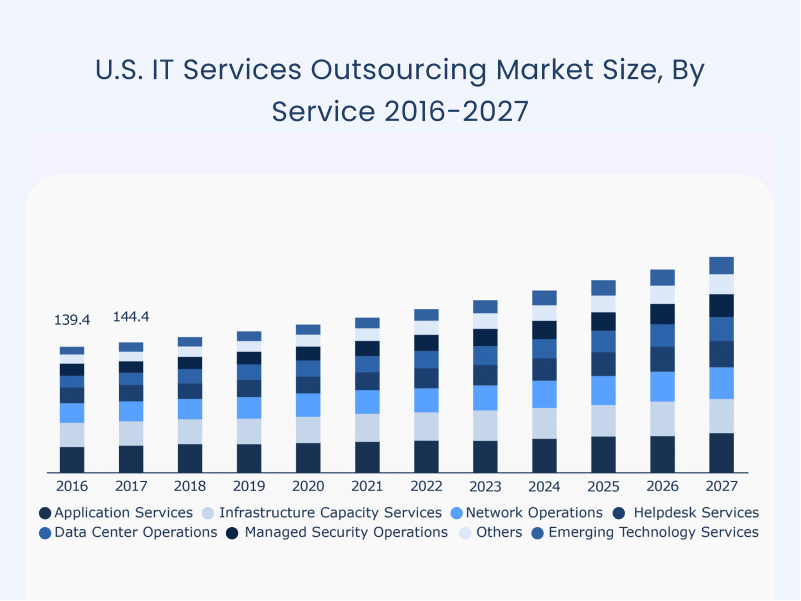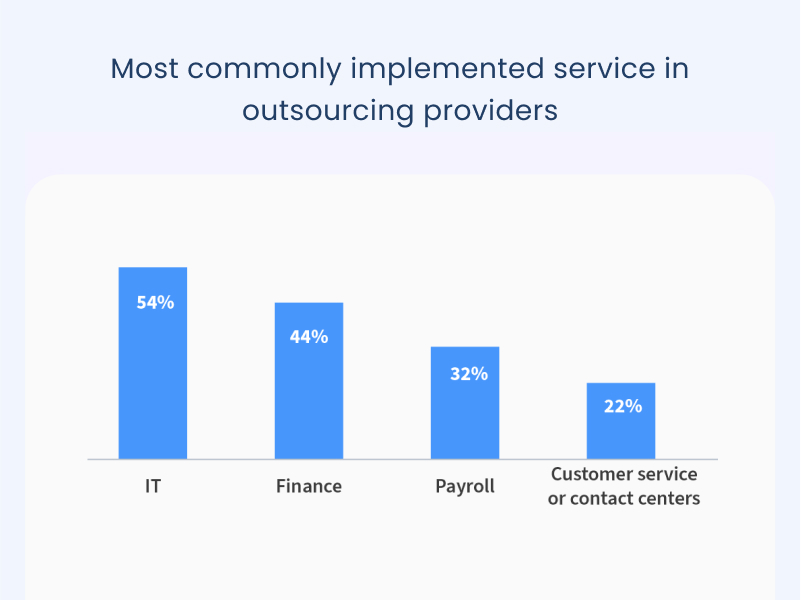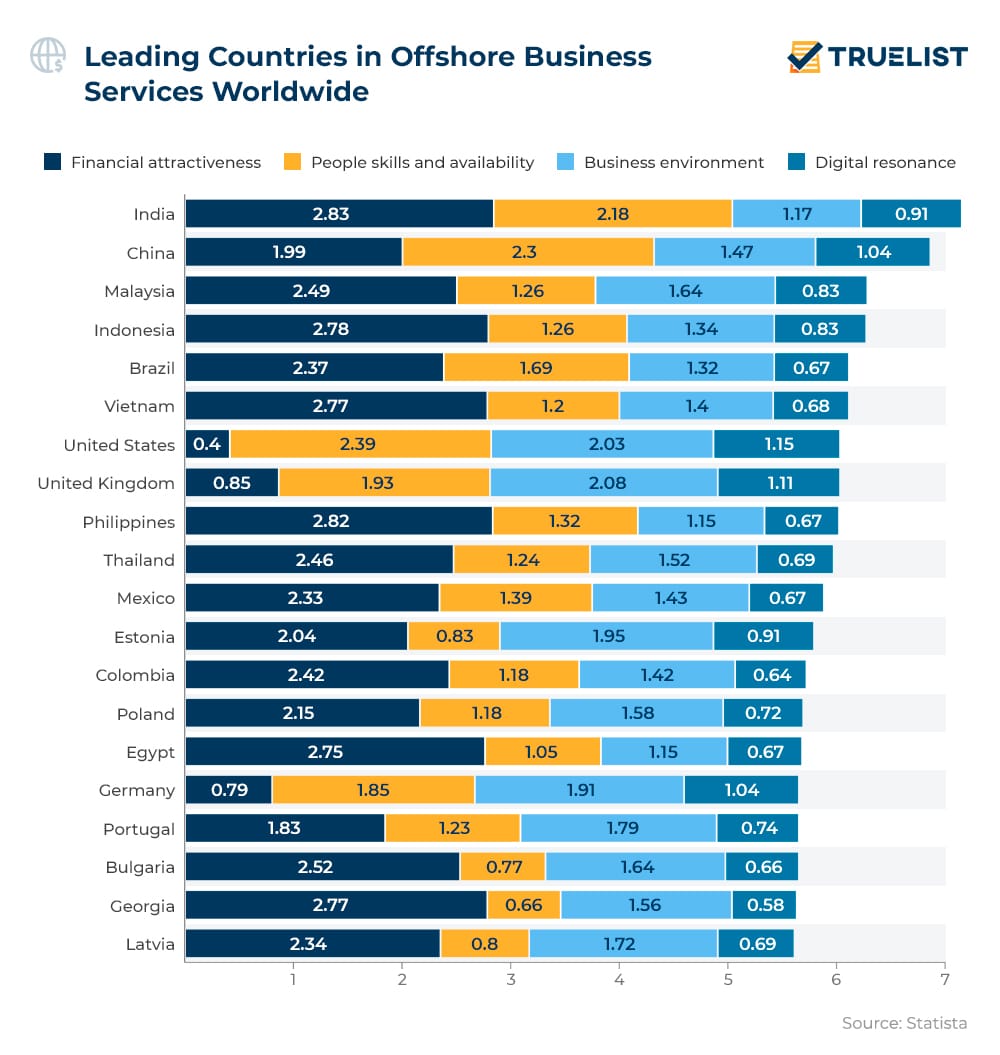Do you find it hard to decide which one of the two options, offshore or nearshore, would be best for your company? Go through the detailed comparison between Offshore and Nearshore to make the right decision.
Offshore and nearshore are business terms referring to the process of hiring a company or an individual who resides outside your country for product or software development.
Under offshore software development, companies can outsource their product or software development tasks to faraway regions.
However, Nearshore software development is outsourcing software development in close-by countries.
Offshore and Nearshore Outsourcing Service offers great business benefits, including cost savings, shorter turnaround times, and access to new skill sets. This can benefit small businesses or startups looking to keep costs down without compromising quality.
You being a startup, can also reap several benefits from offshore and nearshore outsourcing. We will explore them all here, but before that, let’s understand and compare what Offshore and Nearshore are.
Here, look at how US IT services outsourcing market size is growing from 2016 to 2027.
Also Read: Offshore Resource Hiring-E-Guide

A Quick Comparison Between Offshore & Nearshore Outsourcing
Offshore Outsourcing |
Nearshore Outsourcing |
| Offshoring or outsourcing your work to a faraway country with 30 hours of flight and sleeping arrangements | Nearshore Outsourcing your work to a nearby or neighboring country with a maximum of 5 hours of flight |
| It’s difficult to go for real-time collaboration because of 7,10 hours time difference | It allows real-time collaboration because of the same time zone |
| Similar cultures because of low geographical distances | Radically distinct civilizations because of big geographical distances |
| Services are cheaper because under offshore outsourcing, companies look for countries with low labour charges and development cost | The services are comparatively expensive because companies don’t look for the low labour or development cost |
| Need a dedicated project manager to enable real-time assistance | Regular performance monitoring is possible because of the same time zone. |
This was a quick comparison between offshore and nearshore outsourcing. Before comparing both, let’s understand what nearshore and offshore software developments are.
Still Confused b/w Offshore and Nearshore? We would like to Assist You
Nearshore Outsourcing
Through nearshore outsourcing, an organization can get work done or services performed by people in neighboring countries rather than in its own country.
Software development, technical support, and call center jobs are among the most commonly outsourced jobs.
Nearshore outsourcing comes with its own advantages and disadvantages. Let’s look at them for a better understanding.
Pros of Nearshore Outsourcing
Closer Geographical Proximity
Closer geographical proximity helps reduce the time lag between when a client requests a service and when that service is delivered.
Since the provider is located in close geographical proximity, there is less communication latency, which can help speed up delivering the requested service. Additionally, cultural familiarity can also help to reduce misunderstandings and miscommunications.
Time Zone Compatibility
Time Zone Compatibility ensures minimal communication and operations disruption due to time zone differences. It benefits businesses that have offices in different parts of the world and need to communicate with each other frequently. Through this feature, companies can avoid scheduling conflicts and ensure that their business runs smoothly around the clock.
This feature refers to the ability of a nearshore vendor to align their operations with their clients in terms to time and working hours. By doing so, the two parties can reduce the need for communication and coordination, thereby increasing efficiency and reducing errors.
Easy Communication
One of the most important benefits of nearshore outsourcing is easy communication. With offices and team members located in the same time zone, it is easy for a team to communicate with the nearshore outsourced team. This eliminates much of the confusion and miscommunication that can occur when working with teams in other countries.
Because cultural similarities often exist between neighbouring countries, there is less adjustment required when working with a nearshore outsourced team than when working with teams in other countries. It leads to a smoother transition and faster ramp-up time for your project.
Cultural Alignment
Cultural alignment can be a huge pro for nearshore outsourcing. When your team is culturally aligned with the team you’re outsourcing; several benefits can come from that. Communication is clearer and more efficient, which leads to a quicker turnaround time on projects.
Miscommunication is minimised, saving time and hassle in the long run. There is also less of a need for training when both teams are already familiar with each other’s work style and culture. Finally, when your team shares the same cultural values as the team they’re outsourcing, it builds trust and strengthens relationships. It leads to future collaborations and even more successful projects.
Also Read: Setting up a Dedicated Offshore Development Center: The Basic Principles
Cons Of Nearshore Outsourcing
Language Barrier
The language barrier is a potential impediment to successful nearshore outsourcing relationships. In some cases, the language barrier can significantly hinder effective communication and collaboration. Misunderstandings, mistakes, and other problems can arise when the parties involved cannot communicate clearly.
Additionally, cultural misunderstandings may also arise in relationships with a language barrier. These cultural misunderstandings can further complicate communications and contribute to overall relationship difficulties.
Limited Talent Pool
One potential downside of nearshore outsourcing is the limited talent pool. Your company may find it difficult to locate qualified workers in the nearby region. This can lead to longer project timelines and increased costs, as you may need to look further afield for the best talent. Additionally, due to language and cultural barriers, communication between your team and the nearshore team may be more difficult than with an onshore team.
Still Confused b/w Offshore and Nearshore? We would like to Assist You
Expensive Than Offshore Outsourcing
Nearshore is more expensive than offshore outsourcing as the cost of living and doing business in certain areas of the United States is higher than in many parts of Asia. This can drive up the cost of wages and other business expenses.
There may be a shortage of qualified workers in certain areas of the United States, which can drive up the cost of labor.
It can be more expensive to ship goods between countries close together than shipping goods far apart. This is because shorter distances mean higher shipping costs due to wear and tear on transportation infrastructure and increased fuel costs.

Offshore Outsourcing
Offshore Outsourcing is a way that businesses transfer their workloads from inside the company to a company in a different location, often to a cheaper place around the world, to reduce costs. A company can hire offshore developers for everything from accounting and customer service to software development and manufacturing.
To understand it better, let’s look at its pros and cons mentioned here:

Pros of Offshore Outsourcing
Cheap Labor Cost
Cheap labor cost is a significant benefit for companies looking for offshore outsourcing software development companies to outsource their work. Offshore locations mainly include developing countries like India, where labor costs are much cheaper than in developed countries, making it an attractive option for companies looking to save money.
Additionally, the workforce in these countries is highly skilled and educated, which makes them a good fit for jobs that require specialized skills and knowledge. The offshore destinations offer a combination of low-cost labor and a talented and skilled workforce.
Access To Industry Specialists
Offshore outsourcing provides companies with access to a global pool of skilled labor. Companies can benefit from reduced operational and staffing costs by outsourcing to countries with lower labor costs.
It also brings in the ability to tap into local industry expertise. By working with a third-party provider with years of experience in your industry, you can gain access to specialized skills and knowledge that would otherwise be difficult to find in-house. This can be valuable for companies looking to get up to speed quickly on new technologies or trends in their industry.
Round-the-Clock Work
Offshore outsourcing offers round-the-clock work, as it allows the client to have greater control over the project and enables them to track the project’s progress more easily. Additionally, it allows for faster response times in emergencies or unexpected problems.
Offshore outsourcing software development companies that offer round-the-clock work typically have staff working night shifts and day shifts, so there is always someone available to address any issues that may arise. This type of staffing arrangement also allows for a more consistent level of service quality since staff is less likely to be overwhelmed with work during peak hours.
Increased Efficiency
Offshore Outsourcing can greatly increase work efficiency. By outsourcing work to lower-cost countries, a company can save big on labor costs. It is especially beneficial for businesses with tight budgets or price-sensitive industries.
It can also help businesses to become more efficient by allowing them to focus on their core competencies and outsource other tasks that may not be as critical to their success.
Offshore outsourcing can also lead to increased efficiency within the outsourced company, as they will likely have more experience and expertise in the work that they are doing than the company that is outsourcing the work. This increased efficiency can lead to lower costs.
Improve Focus On Core Business Activities
When a company chooses to outsource certain functions to an external provider, it can free up internal resources to focus on more strategic initiatives and tasks. Companies can save money by not complying with the many regulations imposed on businesses in developed countries.
For example, environmental, workplace safety, and labor regulations can be expensive and time-consuming to follow. Companies can save a lot of money by outsourcing work to a country where these regulations are less stringent or nonexistent.
Additionally, working with an external service provider can help a company improve its overall efficiency and productivity since the provider will likely have more experience and expertise in the specific function being outsourced.
Also Read: Busting Offshore Software Development Myths
Cons of Offshore Outsourcing
Time Zone Differences
One of the main disadvantages of offshore outsourcing is the time zone difference. When working with a provider who is in a different time zone, you may find communication issues due to the time difference. In addition, there may be a delay in getting responses to queries or requests.
Another disadvantage of offshore outsourcing is the proximity factor. Suppose your company is based in North America, and you outsource to a provider in Asia. In that case, there will be a significant amount of latency (delay) in data transmission between the two locations. This can cause real-time application problems and lead to team members misunderstandings.
Cultural And Social Differences
Cultural and social differences can be a major barrier to successful offshore outsourcing. For example, in some cultures, it is considered rude to criticize someone’s work in front of them. In other cultures, discussing mistakes and offering suggestions for improvement is considered normal. This cultural difference can lead to misunderstandings and conflict if the two groups work together on a project.
Similarly, social differences can also create problems. For example, it is considered impolite or even improper in some cultures to discuss business matters outside of work hours. This can lead to confusion and frustration when one group feels that they are not able to get any work done because the other group is always talking about non-work related things.
Still Confused b/w Offshore and Nearshore? We would like to Assist You
Geographical And Political Unrest
People often offshore outsourcing in search of lower costs. However, political and geographical unrest can lead to increased costs and other risks that can offset any potential savings.
For example, the Arab Spring uprisings in late 2010 and early 2011 led to significant increases in business costs in North Africa and the Middle East. Political instability, social unrest, and violence drove up insurance prices for companies operating in those regions. And as we’ve seen in recent years, there is always a risk that natural disasters (like hurricanes or earthquakes) could cripple an offshore outsourcing operation.
Geographical unrest can also lead to supply chain disruptions.
Job Displacement In The Home Country
When a company outsources work to a foreign country, it is said to be “displacing” jobs. This means that the jobs are moved out of the company’s home country and sent to a foreign country.
Offshore outsourcing has led to the displacement of many jobs in the United States. When companies outsource jobs to other countries, they often do so by moving those jobs overseas. This can lead to layoffs and job losses for the workers in the home country. It can also lead to lower wages and fewer opportunities for native workers.
Quality Concerns
Offshore outsourcing can be a great way to cut costs and improve efficiency, but it’s not without its risks. One of the biggest concerns is quality control. It can be difficult to ensure that products or services meet your standards without proper oversight.
There are a number of factors that can impact quality control when outsourcing offshore: language barriers, cultural differences, and inadequate communication all play a role. Additionally, many companies outsource to foreign factories that may not adhere to the same quality-control standards as those in the United States or Europe. This can lead to defective products or services, which can be costly and time-consuming to fix.
Ultimately, it’s important to weigh the pros and cons of nearshore and offshore outsourcing before selecting the one that suits you the best.
Helpful Resource: India’s Top Offshore Software Development Company
Nearshore Or Offshore – Which One Should You Choose
When You Should Go For Nearshore Outsourcing –
- If you want to choose the right software development outsourcing team for a project within the same economic union, opt for nearshore outsourcing. In that case, the business will face the same kinds of legislation. A nearshoring arrangement enhances accountability, making it a superior choice.
- If you are looking for a business partner within the same economic zone, money will circulate within the exclusive area since it gets injected into the same trade area.
- If you are looking for reduced barriers with an increasing mutual understanding of culture, language, and values.
- If you want to have control on your business projects with a shared time zone, a common language, and a level of experience. If you are looking for developers who can communicate with you, who are available when you need them to be, and who are nearby.
- If you don’t want to waste your time traveling through long flights and conduct face-to-face meetings within a few hours.
When You Should Go For Offshore Outsourcing –
- If you are looking to access qualified developers and testers to whom you can trust to deliver their projects quickly and efficiently.
- If you are looking for software development in a budget with no unforeseen cost.
- If you are looking for constant support and 24/7 availability.
- If you are looking for the finest quality for half the price, you can hire offshore developers.
- If you are looking for a dedicated project manager and team who can work tirelessly on your project.
Conclusion
Whether offshore or nearshore, Outsourcing Software Development Services bring in the benefits of cost savings, access to specialized skills, and improved efficiency. There is only a need to look for a good nearshore or offshore outsourcing software development company to have all the benefits at their best.













